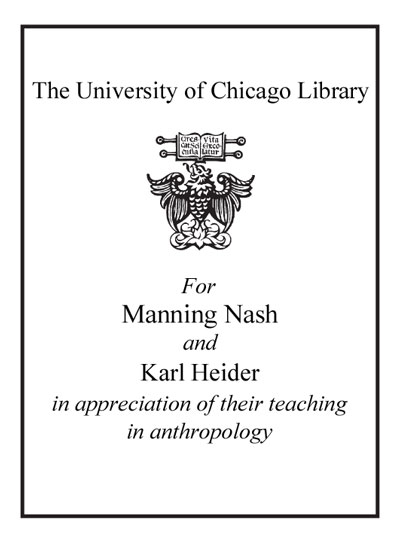Preface Susan W. Tratner and Roger Sanjek This volume has its roots in the predigital era. Roger's edited volume Fieldnotes: The Makings of Anthropology , published in 1990, focused attention on how anthropologists record their experiences when doing ethnographic fieldwork. On its cover are Margaret Mead and Gregory Bateson working in their "mosquito room" in an Iatmul village with the technology of 1938, namely notepads, two manual typewriters, and film cameras. The volume provided an array of perspectives on fieldnotes and fieldwork, introduced useful vocabulary (such as "headnotes" and "scratchnotes"), offered critical guidance to researchers, and has circulated widely and been cited frequently. In the intervening years, technology has changed not only how anthropologists conduct their fieldwork but also how they record, process, analyze, and communicate their findings. These changes present new technical, ethical, and theoretical challenges fieldworkers face that could not have been addressed or anticipated two and a half decades ago. Roger had begun contemplating a successor volume to Fieldnotes when Susan and he happened to meet at a small restaurant in their New York City neighborhood in May 2011. Susan was an anthropologist studying anonymous discussion boards where parents of toddlers and young children post information and express opinions. Our discussions about the impact of new digital technologies on ethnography continued through a score of meetings during 2011-2014. We shared and commented on readings, Susan helped Roger decode and translate digital terminology, and we agreed to co-organize and coedit a volume on "efieldnotes." In 2012, we invited the contributors to this volume to participate in panels we chaired at the 2013 Society for Applied Anthropology (SfAA) meetings in Denver and the American Anthropological Association (AAA) meetings in Chicago (all but three could and did); we also circulated a reading list on Internet ethnography, including work by our coauthors, and hosted overlapping groups of efieldnotes participants at dinner discussions during the 2012 AAA meetings in San Francisco, 2013 SfAA and AAA meetings in Denver and Chicago, and 2014 AAA meetings in Washington, D.C. In an interesting twist on the online versus IRL (in real life) question, the SfAA panel has existed as a podcast (http://sfaapodcasts.net/2013/03/25/efieldnotes-makings-of-anthropology-in-a-digital-world/) since 2013, with presentations by Roger, Jenna Burrell, Martin Slama, and Lisa Cliggett followed by a lively audience discussion. As the wheels of anthropology have turned over the past two and a half decades, so have the wheels of the world and the wheels of our lives during the period in which this book was conceived and produced. In places our readers will visit in chapters that follow, the aftermath of the March 11, 2011, disasters in Japan; the continued violence affecting Kurdistan and Kurds; and the 2014 devastation of Ebola in Liberia have shaped the work and personal lives of many anthropologists, including William Kelly, Diane King, and Mary Moran. More joyfully, seven babies entered the lives of six of our eFieldnotes coauthors: Kenzo Douglas Kubo (Burrell), August and Maurice Jones, Jesus Andrew (King), Julian Channing Kraemer Moore, Luuk Verheijen (Schrooten), and Miles Tratner. Susan would like to express her gratitude to Roger, a true gentleman, for inviting her to be part of this project--none of this would have happened without his confidence and support. She also thanks her SUNY Empire State colleagues for their inspiration and camaraderie, and Dean Cynthia Ward for release time to work on this volume. And she remains grateful for her parents Alan and Irene Warshauer, her families by birth and marriage, and her friends the Baias, Lewin/Matthews, and Meyers, who are like family. Finally, home is where the heart is, and her heart belongs to Matthew, Ian, and Miles: thank you for filling my life with music, laughter, and joy. Roger would like to acknowledge his sister-in-law Mary Morioka, who told him to "go for it" following William Kelly's 2010 email (see Chapter 1, this volume). And we both acknowledge the supportive appraisal and sage advice of our University of Pennsylvania Press reader Don Brenneis, as well as the gracious and welcome assistance of Peter Agree, Amanda Ruffner, Elizabeth Glover, Eric Halpern, Erica Ginsburg, and Catherine Chilton at the Press. Excerpted from EFieldnotes: The Makings of Anthropology in the Digital World by Roger Sanjek, Susan W. Tratner All rights reserved by the original copyright owners. Excerpts are provided for display purposes only and may not be reproduced, reprinted or distributed without the written permission of the publisher.

